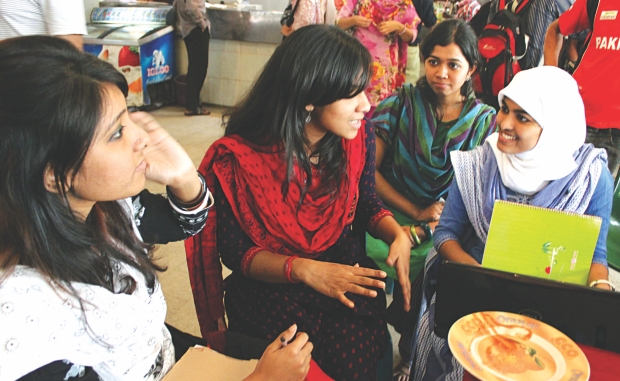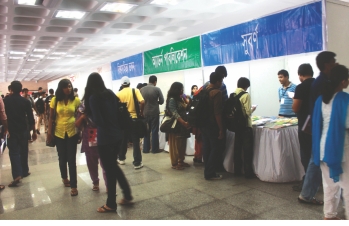|
Post Campus
Why do we go to the university?
Asrar Chowdhury
The HSC results are out. Coaching centres throughout Bangladesh are housing HSC and A Level aspirants who are trying hard to get admitted in one of the universities of Bangladesh. The decision to study in a university is an individual choice. It depends on the student and their family. The question that can be asked is: do we go to the university for the sake of going or are there personal gains from making such a decision? Economic theory has been formally analysing this question for half a century.

'Campus Generation' is intelligent enough to understand the value of how to compete in job markets and make the best of their university education. Photo: Kazi Tahsin Agaz Apurbo
Jacob Mincer from Chicago first introduced the notion of human capital in 1958. Individuals invest time and forego earnings from staying out of work to acquire education. They enjoy the dividends of their investment over a period of time in the job market. As individuals acquire education- from school to the university- they add to their stock of human capital. The more the human capital individuals acquire through education, the larger is the rate of return in terms of wages. It is evident that a university graduate earns more than an HSC or an A Level student simply because they have more stocks of human capital to show in the job market. Therefore, the individual's decision to go to university for higher future earnings is justified. This simple argument has lead to the emergence of the Human Capital School in economics with major contributions from Jacob Mincer, Theodore Schultz, and Gary Becker.
 |
Extra-curricular activities make students' CVs attractive on the job market.
Photo: Kazi Tahsin Agaz Apurbo |
The decision to acquire a university education is the first hurdle individuals cross. The next hurdle is to prepare for the job market where the returns from investment in education will accrue. Universities throughout the world do not only provide education to individual students. They also create an educated workforce. In 1973, while working at Harvard, Michael Spence came up with a very powerful hypothesis. Higher levels of education are associated with higher levels of earnings not only because they raise productivity, but also because a university certifies that a graduate is a good bet for advanced tasks.
It is possible for teachers and institutes to observe the productivity of individual students because the sample size is small and observable. Once students complete their university education and try to enter the job market, they compete with a much larger sample size where the individual productivity of students is no longer directly observable. How does education work in such a market arrangement?
Job market aspirants 'signal' their productivity to employers through various indicators. The most prominent signals include obtained grades, subject or programme, and the name of the university. How does the other side of the market- the employers- respond to these 'signals'? Common sense suggests that the cost of training university graduates for a specific task is lower than that for non-university graduates. Common sense further suggests that graduates from certain universities or certain programmes tend to perform better than graduates from other sources. Employers respond to 'signals' by 'screening' and 'sorting' applicants accordingly. The cost of acquiring this information otherwise would be high for employers. This simple observation has attracted intellectual contributions from Michael Spence, Kenneth Arrow, Joseph Stiglitz and other leading economic theorists.
How do incumbent students respond? First and foremost students need to work hard for a high grade (CGPA). "A high grade itself during our times was good enough when there were only six universities in Bangladesh- Dhaka, Rajshahi, Chittagong, Jahangirnagar, Mymensingh, and BUET".
 |
Job fairs at universities help students choose their fields of interest. Photo: Star |
Today, with hundreds and thousands of university graduates entering the job-market every year- competition is very much alive and kicking. There is a golden rule though. To create value in a labour (job) market one needs to create scarcity, i.e., create an edge over others. Today the Bangladesh economy is much more dynamic than it was two or three decades ago. Besides studies, students need to acquire further stocks of human capital through extra-curricular activities to make their CVs attractive on the job market. The more relevant extra-curricular activities one acquires the stronger the 'signal' sent for employers to easily 'screen' out from other applicants.
As Bangladesh looks forward to becoming a middle-income country, it is the 'Campus Generation' that will take Bangladesh forward in the 21st Century. Universities are just a launching pad towards achieving this end. We go to the university to acquire human capital and also to acquire 'signals'. Today's 'Campus Generation' is intelligent enough to understand the value of how to compete in job markets and make the best of their university education. Bon Voyage!
(The author teaches economic theory at Jahangirnagar University and North South University.)
|
